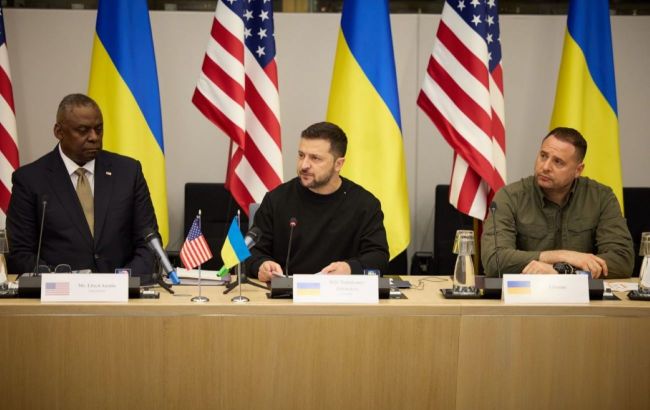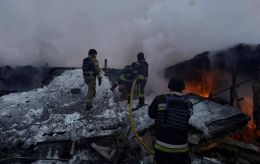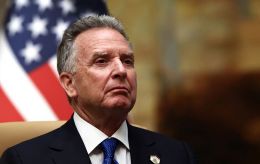Not time to talk: Reasons behind inaccessibility of Ukraine-Russia peaceful agreement, and Western perspective
 Western media reports that allies are discussing the possibility of Ukraine talks with the Russian Federation, but Volodymyr Zelenskyy denies it (Photo: president.gov.ua)
Western media reports that allies are discussing the possibility of Ukraine talks with the Russian Federation, but Volodymyr Zelenskyy denies it (Photo: president.gov.ua)
Peace talks between Ukraine and Russia remain a distant prospect. At least until either side achieves a breakthrough in the war. However, the topic is increasingly surfacing in the Western press, particularly due to potential issues with military and financial support for Kyiv.
Read about why the peace process is currently impossible, what the sides are willing to discuss, and how the beginning of negotiations is envisioned in the overview by RBС-Ukraine.
During the preparation of this article, material from BBC, The Washington Post, NBC News were used, as well as statements from officials of the US, European countries, Ukraine, and Russia
Peace negotiations: The beginning and end
The first round took place on February 28, 2022, when aggressor forces rapidly seized the south and east, approaching Kharkiv and attempting to attack Kyiv. Talks on Belarusian territory lasted for five hours during which the parties outlined their priorities.
The second round occurred in the Białowieża Forest, discussing military and humanitarian blocks as well as the future resolution of the war. Agreement was only reached on the format of humanitarian corridors and a possible temporary ceasefire for evacuating civilians. In the third meeting, the parties agreed to discuss the basic political block.
On Belarusian soil, Kremlin representatives demonstrated a complete lack of understanding of Ukraine's political system and social realities, showing reluctance towards substantive discussion. Their demand to make Russian the second state language crumbled against the stark arithmetic as even by maximum calculations, there weren't enough votes in the Ukrainian Parliament. The dialogues vividly illustrated the differences between Ukrainian and Russian political cultures.
"They mentioned the Shukhevych (a military leader of the nationalist Ukrainian Insurgent Army - Ed.) monument in Zakarpattia, telling us, 'You can call there and tell them to remove it.' We say: No, we can't, that's the competence of local self-government. The community gathered and voted to erect the monument. They: What do you mean, it voted?" - recounted RBC-Ukraine one of the participants of those events.
The negotiations between Foreign Ministers Dmytro Kuleba and Sergey Lavrov in Türkiye did not lead to a breakthrough. Afterward, the delegations attempted to discuss the withdrawal of Russian troops, compensation for destruction, and a ceasefire formula. After the fifth round, President Volodymyr Zelenskyy called for direct talks with Vladimir Putin, but Moscow considered such an option "if both sides move closer to a settlement."
As recalled by Presidential Office advisor Mykhailo Podolyak, in the first weeks, Ukraine sought to halt hostilities during negotiations. The Russians literally read out the text of the Ukrainian capitulation, excluding the withdrawal to the borders until February 24.
"Russia wanted us to hand over the entire Ukraine. Supposedly, we had to lay down arms and retreat to permanent deployment locations. Completely inadequate people," he said on one of the TV channels.
At the end of March, the final delegation-format meeting took place in Istanbul. The participants agreed on the approximate content of two documents, based on which Zelenskyy and Putin could have agreed to peace.

Photo: Negotiating possible agreements with Russia in Istanbul (Getty Images)
According to the first of these agreements, Ukraine abandons attempts to join NATO. Instead, it would receive a new security guarantee system, with assurances from the United States, France, Germany, Canada, Poland, and other countries. The second agreement concerned mutual respect for cultures, addressing language issues. Additionally, the Ukrainian side proposed freezing the issue of Crimea and Sevastopol for 15 years, which did not satisfy the Russians.
Immediately after the Istanbul meeting, the Russian Ministry of Defense radically reduced activity" on the Kyiv and Chernihiv fronts. However, the true reasons for the retreat were Russian military failures.
At that time, the key demands were as follows: Ukraine insisted on the withdrawal of Russian forces to positions before the full-scale invasion, compensation for damages, and the provision of security guarantees.
Russia demanded recognition of the Donetsk People's Republic and Luhansk People's Republic *DPR/LPR) within the Donetsk and Luhansk regions, Crimea's inclusion in the Russian Federation, renunciation of NATO membership (allegedly not opposed to joining the EU), demilitarization with a threefold reduction in the size of the Ukrainian Armed Forces, an expansion of Russian language rights, and a so-called "denazification."
As Western media reported, work on the documents continued daily, with both sides exchanging drafts of possible agreements online. The Kremlin spoke of allegedly submitting its project, while the Ukrainian government denied receiving a document that required a substantive response.
The negotiations were seriously complicated by reports of Russian crimes in Bucha and the striking of the flagship of the Russian Black Sea Fleet, the cruiser Moskva. By summer, the negotiations essentially stopped at the level of individual representatives, and then the peace process halted altogether.
A local success was the signing of a grain agreement on July 22, 2022. However, Ukraine did not directly sign any documents with Russia. Both sides signed the grain agreement through intermediaries, namely the UN and Türkiye.
Since then, the main condition has changed - while previously Ukraine was willing to negotiate if the Russians withdrew to positions before February 24, 2022, now it would only negotiate after our troops return to the internationally recognized borders of 1991.
Humanitarian contact. Prisoner exchanges, the Black Sea corridor, and children
Despite the heated phase of the conflict, negotiations have been ongoing, as reported by The Washington Post, regarding three key humanitarian issues: the exchange of prisoners and the bodies of deceased soldiers, the unblocking of Black Sea ports, and the return of Ukrainian children from Russia. In some cases, intermediaries such as Türkiye, Qatar, the UAE, Saudi Arabia, and the Red Cross have been involved. However, most contacts occur directly.
"It's very emotionally challenging. They (the Russians - Ed.) are enemies, but when it comes to the negotiating process, this conflict of interests needs to be overcome. We understand that no matter what relations we have now, we, Ukrainians, are interested in the return of our defenders, and if we reject all communication channels, we won't be able to achieve that," said military intelligence representative Dmytro Usov, who heads the coordination center for prisoner exchanges.
 Photo: Ukraine returns prisoners through a humanitarian corridor at the border with the Russian Federation (t.me/ermaka2022)
Photo: Ukraine returns prisoners through a humanitarian corridor at the border with the Russian Federation (t.me/ermaka2022)
The exchange of prisoners, much like the exchange of deceased bodies, mostly occurs in the Sumy region, at one of the sections of the border with Russia. It operates the only checkpoint through which Ukrainians from occupied territories and Russia can enter Ukraine.
Türkiye remains a primary location for negotiations between the parties. President Recep Tayyip Erdogan maintains connections with both Moscow and Kyiv, condemning the invasion while rejecting Western sanctions against Russia.
According to Usov, within the context of "grain deals", the largest exchange of prisoners to date was agreed upon in the corridors of negotiation. 215 soldiers, including Azov commanders, and 10 foreign military personnel from the Ukrainian Armed Forces were exchanged for 55 Russian officers and pro-Russian politician Viktor Medvedchuk. The latest exchange occurred on August 7, bringing back 22 soldiers to Ukraine.
The Vatican served as one of the mediators. Ukraine had provided lists to the papal nuncio in Kyiv, who sent them through the Holy See to representatives of the Russian Orthodox Church, as reported by WP. Additionally, in October, Qatar facilitated the return of four Ukrainian children from Russia. Since March 2023, Russians have been returning them on a semi-regular basis. For instance, in the first ten days of November, five young Ukrainians were successfully brought back, though, against the backdrop of thousands of children abducted and illegally taken to Russia, these numbers are hard to consider significant.
Are allies pressuring Ukraine?
Last week, on the German channel ZDF, Foreign Minister Dmytro Kuleba responded negatively to queries about secret negotiations with the Kremlin behind closed doors. He reiterated that the foundation of the Peace Formula was respect for Ukraine's sovereignty and territorial integrity.
"If we translate from diplomatic language to plain language, it means Russia needs to leave Ukraine. Until this happens, until they are ready for it, there's no point in conducting any negotiations," he stated.
Shortly after, NBC News released a report stating that US and European officials had started discussing the possibility of peaceful negotiations with Russia. Allegedly, this included considerations about what conditions Ukraine might have to abandon. Some of these questions were raised in October during the Ramstein allies' meeting.
Some American officials, regarding the battlefield situation, use the chess term "stalemate," expressing concerns that the US might not be able to assist Ukraine adequately due to funding allocation issues. They worry that Ukraine might be running out of steam in the fight, while Russia's resources seem endless.
"Any decisions about negotiations are up to Ukraine. We are focused on continuing to stand strongly in support of Ukraine as they defend their freedom and independence against Russian aggression," said a representative from the National Security Council at the White House, Adrienne Watson.
US President Joe Biden addressed Congress, requesting the approval of billions in military aid to Ukraine. The request has yet to succeed due to the positions of some Republicans. Moreover, in his administration's view, there are no signs of real readiness on Vladimir Putin's part to engage in negotiations. According to American officials, Putin still believes that allies will tire of Ukraine and cease military supplies.
.jpg) Photo: The Biden administration assures that the US isn’t pressuring Ukraine regarding negotiations (GettyImages)
Photo: The Biden administration assures that the US isn’t pressuring Ukraine regarding negotiations (GettyImages)
At the same time, a Gallup poll indicates a decline in public support: 41% of Americans believe that the US is already doing too much for Ukraine. Only three months ago, this figure was half as low. Today, about a quarter of Americans say that the US isn't providing enough support to Ukraine. A similar trend is observed in Europe.
As NBC News reports, allies might offer guarantees of security to Volodymyr Zelenskyy without a formal entry into NATO. This comes as there's a growing sense in the West that it's time to strike a deal. However, a high-ranking official in the Biden administration rejected the notion that Washington would push Kyiv into negotiations.
During a recent press conference, Zelenskyy refuted the presented facts and emphasized that Ukraine is not ready for territorial concessions.
"Everyone knows my attitude, which coincides with the attitude of Ukrainian society … Today no one is putting pressure, not one of the leaders of the EU or the United States. For us now to sit down with Russia and talk and give it something - this will not happen," he stated.
What's being said publicly in the West
Western partners do not exclude the possibility of peaceful negotiations but emphasize that the decision rests with Ukraine, as do the conditions underlying any agreement. In September, US Secretary of State Antony Blinken noted that negotiations were currently impossible, because "it takes two on tango. And thus far, we see no indication that Vladimir Putin has any interest in meaningful diplomacy. If he does, I think the Ukrainians will be the first to engage."
Czech Minister of Foreign Affairs Jan Lipavský said that imposing any peaceful initiatives might lead to trouble for the West.
"If Ukraine is forced to make an unacceptable decision, the West will lose it, and there will be a 40-million nation feeling betrayed at our borders. We don't just want to postpone the war. We want to put an end to Russia's ability to expand forcefully to the West," he stated.
Czech President Petr Pavel believes that negotiations might start in 2024 since events are unfolding in a less optimistic way for Ukraine, and it's unlikely to gain a military advantage over Russia. Italian Defense Minister Guido Crosetto believes that the process could start in the spring, supposedly after the warring parties exhaust their offensive potential. In his opinion, they need a political peace.
"Ukraine is fighting to defend its sovereignty and to adhere to international law, not just for freedom. Obviously, a strong peace cannot be based solely on military actions. A political ceasefire is needed. The time has not yet come," he added.
 Photo: Czech President Petr Pavel fears that time is not working in favor of Ukraine (Getty Images)
Photo: Czech President Petr Pavel fears that time is not working in favor of Ukraine (Getty Images)
Negotiations are also advocated in Austria. Foreign Minister Alexander Schallenberg believes that "sooner rather than later" is better, as peace is achieved at the table, not on the battlefield. In response, the German media outlet Bild quoted a representative of the Ukrainian government assuring that Kyiv won't start negotiations even if pressure from the European Union increases.
Overall, allies are united in support of the Ukrainian position. In particular, Lithuanian Foreign Minister Gabrielius Landsbergis warns that the West is dangerously close to missing the opportunity to end the imperial aggression of the Kremlin. According to him, if this doesn't happen, "our children will curse us in the trenches we are digging for them."
Deputy Spokesperson of the US State Department Vedant Patel refuted discussions regarding the start of peace negotiations with Russia involving Ukraine. He emphasized that Washington had no knowledge of this.
"Any negotiations depend on Ukraine, and as we have repeatedly said, nothing should happen about Ukraine without Ukraine. We are not aware of any talks with Ukraine regarding negotiations outside the Peace formula," he explained.
French President Emmanuel Macron says it's not yet time to sit at the table, but the time for "fair and good" negotiations may come soon. Today, UN Secretary-General Jens Stoltenberg reiterated that Ukraine would decide for itself what conditions were acceptable for it. Strengthening its military potential and providing support was the only way to compel Putin to start a peaceful process.
Why negotiations are impossible
In a September interview with The Economist, Volodymyr Zelenskyy rejected the idea of compromise with Putin and stated that the war would continue as long as Russia remains on Ukrainian territory. According to him, any deal with the Kremlin won't be permanent because the Russian dictator has a habit of creating frozen conflicts.
"The mistake is not diplomacy. The mistake is diplomacy with Putin. He negotiates only with himself," said the Ukrainian president confidently.
 Photo: Ukrainian President Volodymyr Zelenskyy rules out the possibility of negotiations with Vladimir Putin (Getty Images)
Photo: Ukrainian President Volodymyr Zelenskyy rules out the possibility of negotiations with Vladimir Putin (Getty Images)
Reacting to these words, Putin's side stated that Ukraine would have to start negotiations "recognizing the realities that emerged since March 2022." This refers at least to the occupation of parts of Ukrainian territories in the south and east. As for Putin himself, he regularly complains about the reluctance to negotiate with him.
"If the Ukrainian side really wants a negotiation process, then it is necessary to do so not with some theatrical gestures but to repeal the decree of the President of Ukraine that prohibits negotiations," he said during an October visit to China.
It should be noted that in response to referendums in the occupied territories, Zelenskyy put into effect the decision of the National Security and Defense Council of September 30, 2022, which stated the impossibility of negotiations with Putin.
However, Moscow demonstrates readiness for political discussions. Defense Minister Sergey Shoigu cynically urged interested countries to join forces to form a "just world order." According to Secretary of the National Security and Defense Council Oleksiy Danilov, this is another indication of the impossibility of defeating Ukraine on the battlefield.
Dmytro Kuleba reminds that from 2014 to 2022, about 20 ceasefire agreements were reached, all of which Russia immediately violated. And none of the 200 rounds of negotiations ultimately prevented Putin from daring to carry out a full-scale invasion.
Advisor to the Head of the Presidential Office Mykhailo Podolyak explains the impossibility of peaceful initiatives by stating that Russia wants the capitulation of Ukraine regardless of what is envisaged in negotiations. All its calls are aimed at consolidating the occupied territories, freezing the conflict, and avoiding responsibility for war crimes.
***
According to the theory of Hain Goemans, a political scientist from the University of Rochester (New York, USA), the first rule of ending a war is a change in demands by at least one of the parties. Obviously, neither Ukraine nor Russia has reached the point where goals have changed enough to talk about a peaceful agreement. Currently, our country is trying to secure a strong negotiating position on the battlefield. And to a considerable extent, the end of the conflict in Europe, the largest since World War II, depends on our allies and when it will end.

